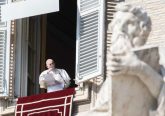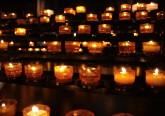More must be done to help Middle East Christians, say speakers

By Mark Pattison Catholic News Service
WASHINGTON (CNS) — More must be done to help the beleaguered Christians of the Middle East, said speakers at a Sept. 11 dinner marking the end of the In Defense of Christians convention in Washington.
Tactics they proposed, though, varied, in hope that some combination of them will make Christians feel secure in their homeland.
Kirsten Evans, In Defense of Christians executive director, said participants at the convention fanned out Sept. 10 to lawmakers’ offices on Capitol Hill, talking with more than 300 members of the House or Senate, or their aides.
They pressed for members of Congress to vote for a bill introduced Sept. 9 by Reps. Jeff Fortenberry, R-Nebraska, and Anna Eshoo, D-California, that would label Islamic State’s actions in the region a genocide.
Evans noted that the Congressional Caucus on Religious Minorities in the Middle East had nearly quadrupled in its first year, from 13 to 50.
“We’re not without hope,” said Andrew Doran, In Defense of Christians’ senior adviser. “We have briefed several presidential candidacies on the plight of Christians.”
Bishop Gregory J. Mansour of the Eparchy of St. Maron in Brooklyn, New York, urged those in attendance to stand for his prayer. “You know what day this is,” he told them. Bishop Mansour prayed “that God will removed hatred from this world.”
He prayed that God give those at the dinner, “and I say this sincerely, defiance. Defiance.” Bishop Mansour said, “With love, we are not the same as ISIS. If we hate, we are the same.”
Syriac Catholic Patriarch Ignace Joseph III Younan said before the dinner he doesn’t even like to use the term ISIS to describe Islamic State: “I really don’t like the acronym of ISIS, as it’s a perfume for nice ladies.” He lamented an Islamic State action in which the priest of a town near Palmyra, Syria, was murdered and 200 people taken away.
“It’s a real Christian cleansing,” Patriarch Younan said. “The Christians are (the) target because they are Christians and they have no one to defend them and liberate their lands.”
The patriarch noted Pope Francis’ declaration in April in which he condemned the Armenian slaughter by Ottoman Turks 100 years ago as “the first genocide of the 20th century.” The Syriac Christians of the Middle East, the patriarch added, are “facing the first genocide of the 21st century.”
Rabbi David Saperstein, now ambassador at large for international religious freedom, said in after-dinner remarks that the Islamic State is “radically and diametrically opposed to religious freedom,” with 12 million Syrians displaced since a multi-sided civil war began in 2012, and “in Iraq, more than 3 million people have fled their homes in the last year and a half.”
He added, “It is the desire of ISIL to remove these groups form their midst. … They must be held accountable.” ISIL is another acronym used for the Islamic State.
Rabbi Saperstein said, “You know the actions we have taken (to stop the Islamic State). They have helped. But they are not enough.” Until ISIL is defeated, “religious communities must be assured of a quality of life … that will allow them to return to their homes,” he added. This includes schooling for children and jobs for those “ready to work,” he said.
Carl Anderson, supreme knight of the Knights of Columbus, took note of the churches and antiquities destroyed by the Islamic State in its ongoing campaign. “We mourn the physical destruction of beautiful things,” he said, “but nothing is as precious and beautiful as our brothers and sisters.”
Commenting on the ongoing crisis of Syrian refugees fleeing to Europe to escape the war, Anderson said he was glad to hear the United States and Canada would be accepting refugees. “We applaud them,” he added. “But how many of them will be Christians?” he said to applause.
This year, none of the speakers at the In Defense of Christians dinner was elected officials. At last year’s dinner, Sen. Ted Cruz, R-Texas, halted his remarks early when he was booed by the predominantly Arab audience after telling them to make the state of Israel their ally.
Posted Sept. 15, 2015













